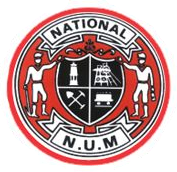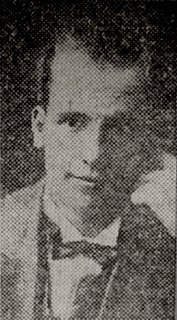Related Research Articles

The National Union of Mineworkers (NUM) is a trade union for coal miners in Great Britain, formed in 1945 from the Miners' Federation of Great Britain (MFGB). The NUM took part in three national miners' strikes, in 1972, 1974 and 1984–85. After the 1984–85 strike and the subsequent closure of most of Britain's coal mines, it became a much smaller union. It had around 170,000 members when Arthur Scargill became leader in 1981, a figure which had fallen in 2015 to an active membership of around 100.
The National Transport Workers' Federation (NTWF) was an association of British trade unions. It was formed in 1910 to co-ordinate the activities of various organisations catering for dockers, seamen, tramwaymen and road transport workers.
The Miners' Federation of Great Britain (MFGB) was established after a meeting of local mining trade unions in Newport, Wales in 1888. The federation was formed to represent and co-ordinate the affairs of local and regional miners' unions in England, Scotland and Wales whose associations remained largely autonomous. At its peak, the federation represented nearly one million workers. It was reorganised into the National Union of Mineworkers in 1945.
The National Amalgamated Union of Enginemen, Firemen, Mechanics, Motormen and Electrical Workers was a trade union in the United Kingdom. It represented stationary engine drivers and cranemen in a wide variety of industries, as well as less skilled workers in the electrical industry and miscellaneous workers.

The South Wales Miners' Federation (SWMF), nicknamed "The Fed", was a trade union for coal miners in South Wales. It survives as the South Wales Area of the National Union of Mineworkers.

Robert Smillie was a trade unionist and Labour Party politician in Great Britain, especially Scotland. He was a leader of the coal miners, and played a central role in moving support from the miners away from the Liberal Party to the Labour Party. He had a firm commitment to socialism as an ideal, and militancy as a tactic.

The National Union of Scottish Mineworkers (NUSW) is a trade union in Scotland, founded in 1894 as the Scottish Miners Federation. It joined the Miners' Federation of Great Britain, and in 1914 changed its name to National Union of Scottish Mineworkers. It survives as the National Union of Mineworkers.

Joseph Jones was a British trade unionist.
The Lancashire and Cheshire Miners' Federation (LCMF) was a trade union that operated on the Lancashire Coalfield in North West England from 1881 until it became the Lancashire area of the National Union of Mineworkers in 1945.

The Durham Miners' Association (DMA) is a trade union in the United Kingdom.
The North Wales Miners' Association was a trade union representing coal miners in Wales.
The Amalgamated Society of Enginemen, Cranemen and Firemen was a trade union in the United Kingdom. It represented stationary engine drivers and cranemen in a wide variety of industries.
The Cannock Chase Miners', Enginemen's and Surfacemen's Association was a trade union representing coal miners in the Cannock Chase area of England.
The Durham Colliery Mechanics' Association was a trade union representing mechanics working at coal mines in County Durham, in England.
William Browell Charlton was a British trade union leader.
The Durham County Colliery Enginemen's Association was a trade union representing engine operators at coal mines in County Durham.
The Lancashire, Cheshire and North Wales Colliery Enginemen's, Boilermen's and Brakesmen's Federation was a trade union representing engine operators and related workers at coal mines in parts of England and Wales.

Isaac Evans was a Welsh trade union leader and politician.
References
- ↑ "Miners' Federation vs Federation of Colliery Enginemen, Boilermen, and Mechanics". Annual Report of the Trades Union Congress: 201–203. 1921.
- ↑ Marsh, Arthur; Ryan, Victoria (1984). Historical Directory of Trade Unions. 2. Aldershot: Gower Publishing. p. 199. ISBN 0566021617.